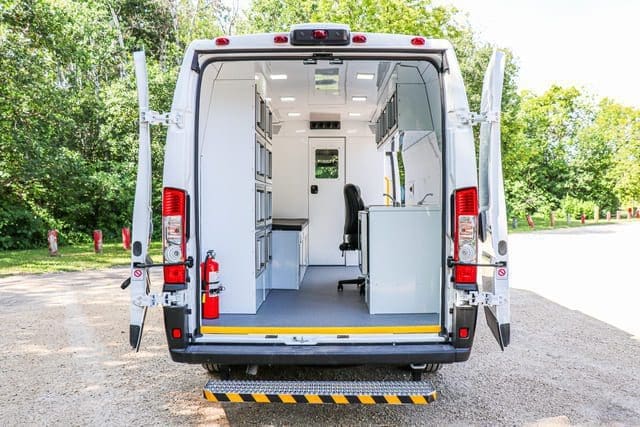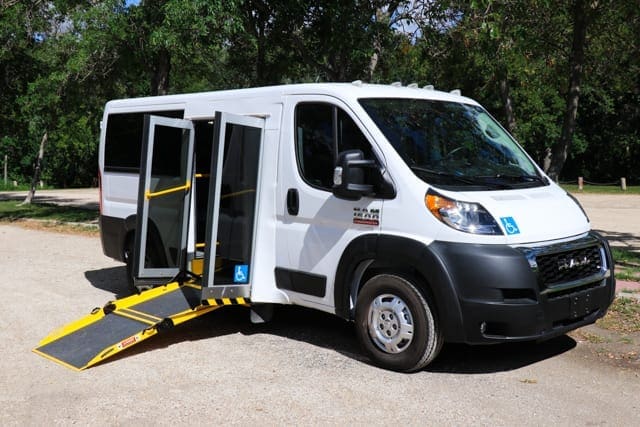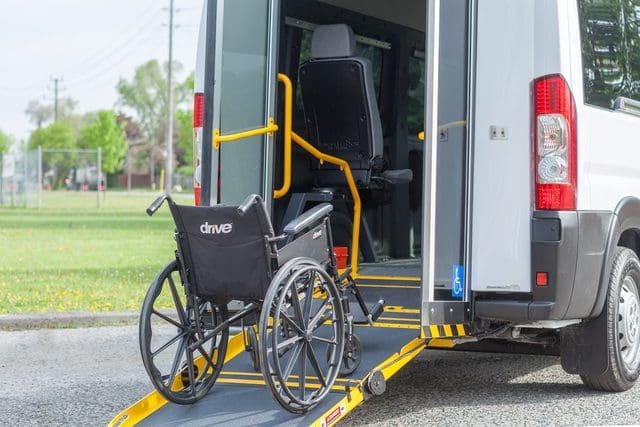Are you ready to overcome the challenges of starting a mobile medical clinic in Canada? If you’re thinking about launching a mobile medical clinic, it can feel overwhelming, especially when you’re facing challenges like securing the right vehicle, sticking to a tight budget, or not having a well-defined plan for your clinic’s goals.
Maybe you’re wondering where to even begin. How can you avoid mistakes like choosing a vehicle that doesn’t fit your needs or failing to raise the funds needed to support your project?
MoveMobility is here to guide you. As a Canadian-based company, we specialize in building customizable mobile clinics that make healthcare more accessible in cities like Vancouver and Toronto, remote communities in northern Manitoba, and the rest of the country.
Our expertise lies in helping organizations create innovative, efficient mobile medical solutions that meet their unique healthcare needs. We understand that choosing the right vehicle and plan is critical to your success, and we’re here to help you navigate the process.
In this article, you’ll learn:
- Some pointers on how to develop a comprehensive mobile clinic business plan
- Why partnering with the right manufacturer matters
- The value of building strong community relationships
- How to assemble the best team to drive your clinic forward
Let’s jump into the five tips for starting a mobile clinic in Canada.
1. Consider making a business plan for your mobile clinic
Starting a mobile medical clinic requires thoughtful planning and a solid business plan to guide you.
Here are four key steps to get started:
1. Research your target market
First, identify the community that needs your services the most. This could be rural areas in Northern Ontario where healthcare access is limited, or underserved neighborhoods in cities like Toronto. Understanding the specific needs of your target population will help shape your services and overall clinic strategy.
2. Define your services
Next, decide what medical services your clinic will provide. Ask yourself:
- Will you offer basic check-ups or specialized services like mental health counselling or overdose prevention?
- Can you adjust your services to meet the needs of your target community?
For example, a mobile clinic in rural Saskatchewan might focus on diabetes care that involves mobile dialysis treatment, while one in Vancouver may offer mental health resources.
3. Create a budget
A detailed budget is the third important step. Include:
- Vehicle costs for your mobile clinic.
- Medical equipment and supplies needed for your services.
- Staffing costs for healthcare professionals.
- Insurance to protect your clinic and staff.
- Marketing to promote your clinic.
- Fuel and maintenance for day-to-day operations.
Look for funding sources such as Canadian government grants or private healthcare programs to help cover expenses and keep your clinic running smoothly.
You’ll need a solid marketing plan to ensure your mobile clinic reaches the people who need it. Spread the word through various channels like social media, local community centers, and partnerships with nonprofits or healthcare groups. Make sure to highlight your clinic’s accessibility and how it brings healthcare directly to underserved communities.
You can also promote your services at local events or health fairs. Clear communication about your clinic’s schedule and locations will help build trust and attract patients who might not otherwise have access to regular care.
2. Find the right mobile clinic manufacturer
Choosing the right company to build your mobile medical clinic is a huge decision. With so many choices, it can feel tricky to know who to go with. But picking the right manufacturer is super important to make sure your clinic meets your needs—whether you’re serving busy cities like Toronto or smaller, remote towns in places like Northern Quebec.
Here’s why it’s so important:
Safety first: A good manufacturer will make sure your clinic follows all safety regulations. This means the vehicle and medical equipment will be set up correctly, resulting in fewer issues down the road.
Custom options: No two mobile clinics are exactly the same. You’ll want a manufacturer who can customize the layout and equipment to fit your clinic’s unique services. The layout should work best for your team when providing primary care, dialysis treatment, or mental health support.
Built to last: Canadian weather and roads can be rough, especially in rural areas. Your mobile clinic needs to handle everything from harsh winters in Saskatchewan to rocky back roads in northern Alberta. A well-built clinic will last longer and save you money on repairs.
Efficient design: A smart design makes everything easier. With the right layout, your staff can work more efficiently, and patients can move through the clinic smoothly.
Support when you need it: Make sure your manufacturer offers ongoing support and maintenance so your mobile clinic isn’t out of service for long.
Picking the right manufacturer means your clinic will work well, stay safe, and last for many years to come.
Check out the video below to learn about the cost of a mobile clinic.
3. Permits and licenses
Before you can run a mobile medical clinic in Canada, you’ll need to secure the right permits and licenses. These vary depending on where your clinic will operate. Reaching out to your local government for guidance is helpful in understanding what’s required in your region.
Navigating these regulations can feel overwhelming, but here’s how to stay on track:
Consult a lawyer: A healthcare lawyer can help you make sure you’re following all the rules and won’t miss any critical steps.
Seek advice from healthcare advisors: They can offer insights into health and safety standards and help ensure your clinic meets all the necessary regulations.
Renewals: Permits and licenses usually need to be renewed annually, but this varies by location. Contact your local licensing boards for the latest details.
Inspections: Expect inspectors to visit your mobile clinic to ensure it meets health and safety standards. They’ll check for:
- Safety and cleanliness
- Patient records
- Staff qualifications
Keeping up with these permits, licenses, and inspections helps your clinic operate smoothly without legal hiccups.
4. Develop mobile clinic partnerships
Building partnerships is key to making your mobile medical clinic a success. Teaming up with the right people can give you the support and resources you need.
Here are some tips for developing partnerships:
Find like-minded partners: Look for hospitals, clinics, or community groups that share your goals. For example, if you’re helping underserved communities in Vancouver, find partners that care about the same issues.
Attend local events: Community events are a great way to meet potential partners. Chat with people, explain your clinic’s mission, and let them know how you’re helping.
Connect with local government: Reach out to city officials or health departments. They may offer advice, resources, or even funding to support your clinic.
Corporate sponsors: Many businesses want to help out. See if local companies are willing to sponsor your clinic or donate supplies.
Partner with schools: Medical or nursing students can volunteer, gaining hands-on experience while helping your clinic serve more people.
Make sure to clearly explain your mission to potential partners and show how your clinic will make a difference for people who struggle to access healthcare.
5. Remember to offer culturally competent care
It’s really important to ensure that all your patients feel comfortable and understood, no matter where they come from or what language they speak. Culturally competent care means respecting different cultures, traditions, and ways of life so your patients get the care they need.
Here’s how you can do that in your mobile clinic:
Build a diverse team: Having staff who come from different backgrounds and can speak multiple languages helps make patients feel more comfortable.
Provide cultural training: Train your staff so they understand different cultures and beliefs. This makes it easier for them to connect with patients from various communities and know what’s important to them.
Use interpreters: If you’re in an area where some patients speak other languages like Cree, Punjabi, or Mandarin, having an interpreter can help. It makes sure that everyone understands what’s happening during their visit.
Get to know the community: Spend time talking with community leaders and local people to understand what they need most. This will help you offer services that really make a difference in their lives.
Share information in different languages: Make sure patients can read important health information in their own language, whether it’s French, Arabic, or another common language in the area.
Do you have any questions about starting a mobile clinic in Canada?
You made it to this article because you’re looking for advice on starting a mobile health clinic in Canada.
If you follow the five tips in this guide, you’re already on the right path toward making your clinic a reality.
At MoveMobility, we’re passionate about helping clinics like yours succeed. If you need help choosing the right vehicle or understanding the next steps, we’ve got the experience, tools, and team to support you. Additionally, if you have more questions or want to learn more, feel free to reach out to one of our experts by clicking the button below.
Also, be sure to explore more of our articles for tips and advice on how to launch a successful mobile clinic!
Check out our article on the different types of equipment you can get in your mobile clinic. This will give you a better idea of what type of healthcare is possible.
After that, check out our article on what you can use a mobile clinic for. It’ll help you further align your mission with these innovative vehicles.






